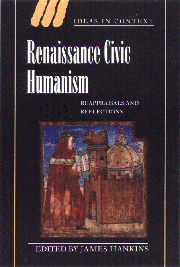Book contents
- Frontmatter
- Contents
- List of contributors
- Introduction
- 1 The republican idea
- 2 “Civic humanism” and medieval political thought
- 3 Civic humanism and Florentine politics
- 4 The two myths of civic humanism
- 5 Rhetoric, history, and ideology: the civic panegyrics of Leonardo Bruni
- 6 De-masking Renaissance republicanism
- 7 Civic humanism, realist constitutionalism, and Francesco Guicciardini's Discorso di Logrogno
- 8 Bruni and Machiavelli on civic humanism
- 9 Rhetoric, reason, and republic: republicanisms – ancient, medieval, and modern
- 10 Situating Machiavelli
- Index of manuscripts and archival documents
- General index
- Ideas in context
9 - Rhetoric, reason, and republic: republicanisms – ancient, medieval, and modern
Published online by Cambridge University Press: 06 October 2009
- Frontmatter
- Contents
- List of contributors
- Introduction
- 1 The republican idea
- 2 “Civic humanism” and medieval political thought
- 3 Civic humanism and Florentine politics
- 4 The two myths of civic humanism
- 5 Rhetoric, history, and ideology: the civic panegyrics of Leonardo Bruni
- 6 De-masking Renaissance republicanism
- 7 Civic humanism, realist constitutionalism, and Francesco Guicciardini's Discorso di Logrogno
- 8 Bruni and Machiavelli on civic humanism
- 9 Rhetoric, reason, and republic: republicanisms – ancient, medieval, and modern
- 10 Situating Machiavelli
- Index of manuscripts and archival documents
- General index
- Ideas in context
Summary
The language of classical republicanism has long been recognized as one of the central modes of political discourse in early modern Europe. In returning to the theories as well as practices of the republics of the Greco-Roman world, the early modern republicans sought a model to cope with the tumultuous changes in the politics of their own times. Yet scholars have also come to realize that early modern interest in classical republicanism was hardly exceptional. In many ways, European Renaissance theorists of a “civic humanist” bent were simply carrying forward a republican project which had already commenced during the Latin Middle Ages. Working with largely the same ancient sources as their successors, medieval authors pioneered the republican ideas and language that would be extended and elaborated in the early modern world.
The present study examines some threads of republican theory as it emerged and was restated over more than a millennium and a half. Specifically, the study defends three interrelated claims. First, I argue that the republicanism of antiquity lacked a unitary theoretical starting-point, resting instead on multiple and perhaps incommensurable foundations. Heterogeneous elements may be detected even in the work of a single thinker, such as Marcus Tullius Cicero. A careful examination of Cicero's writings suggests that it may be more appropriate to speak of classical republicanisms. Second, I contend that the gulf between competing versions of classical republicanism was reiterated in differences between late medieval thinkers, such as Marsilius of Padua and Nicholas of Cusa, who were writing within a republican framework.
- Type
- Chapter
- Information
- Renaissance Civic HumanismReappraisals and Reflections, pp. 247 - 269Publisher: Cambridge University PressPrint publication year: 2000
- 3
- Cited by

